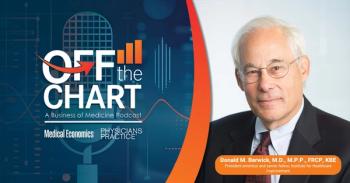
Sunshine Act Shedding Light on Physician-Pharma Rep Relations
Health reform will bring more transparency to the physician-pharma rep relationship. Here's how your practice can comply and still maintain business as usual.
Everyone seems to have an opinion on the pros and cons of pharmaceutical representatives interacting with healthcare providers. Often, there is so much negative press on the subject that we rarely stop to think about the flip side. While the headlines focus on payments to physicians who act as consultants for pharmaceutical companies, the untold story is that there are tens of thousands of medical practices that recognize the fundamental value pharma reps bring to providers and patients.
Now, because the Sunshine Act adds a new wrinkle to the physician-drug rep relationship, practices are uncertain how practice visitation policies should change.
Drug Industry Trends
In order to understand how new legislation may affect physicians and the pharmaceutical industry it is helpful to review recent history. From 2000-2006, the U.S. drug industry added 30,000 representatives to its sales force, according to consulting firm ZS Associates. An informal survey of 20 practice managers conducted by RxVantage (a cloud-based technology company focused on streamlining the physician-pharma rep relationship) indicates the average family physician fields 20 visits to 30 visits from pharma reps daily, some of whom carry identical products and wait three hours to get a 30-second meeting with the physician. Drug reps often visit the office to deliver life-saving drug samples and educational material, but the cost to manage a rising number of visits can become burdensome for some practices.
By 2008, payers tightened their controls on physician compensation, forcing practices to squeeze in more patient appointments to make up for lost revenue. In addition, the increased media scrutiny on the relationship between physicians and the pharmaceutical industry caused some medical groups to eliminate visits from pharma reps altogether. By 2010, 20 percent of U.S. physicians became low access to pharma reps, according to a report by ZS Associates. Furthermore, RxVantage found that in many cases, pharma reps were forced to plan six months to 12 months in advance just to book an educational lunch-meeting with the medical office staff and providers.
At the same time, the pharmaceutical industry began to transition to a new strategy that decreased its sales force by 30 percent, according to Cegedim Strategic Data, a global pharmaceutical market-research firm. Several large drug manufacturers consolidated, many branded drugs came off patent, and fewer new medications entered the market.
The Sunshine Act
Introduced as part of the Affordable Care Act, the Sunshine Act intends to bring transparency to financial relationships between medical device and drug manufacturers and physicians to decrease the potential for conflict of interest in selecting appropriate treatments for patients. Beginning in July 2013, drug, device, biological product, and medical supply manufacturers will start reporting to CMS information on compensation, gifts, and other "transfers of value" paid to physicians.
A key area of concern for providers is speaking engagements. If the event is considered to be continuing medical education (CME) and the drug or device manufacturer does not pay the physician a speaking fee, nothing need be reported to the government, except any paid expenses for travel and meals.
Likewise, CME practice visits by pharma reps are also exempt. Lunches provided by drug reps may be excluded from physician reporting as long as the transfer of value is less than $10 per person (up to $100/year). In addition, buffet meals and snacks made available to all participants at industry conferences need not be reported.
While the reporting burden falls on the drug or device manufacturer, physicians and other providers will need to register with CMS if they want to receive notification of payments attributed to them. By June 30, 2014, the CMS website will begin making reporting information (retroactive from July 2013) available. Providers then have 60 days to dispute any reported information before it is made available to the public on September 30, 2014. For unresolved disputes, CMS will publish the manufacturer's data but flag it as disputed. In addition, the public website will not contain physicians' identification numbers or names of immediate family members.
Keeping the Door Open
It is no wonder practices are looking to streamline their operations to prepare for the changes coming under healthcare reform. Eliminating pharma rep visits may offer some time savings for practices and keep their names out of the headlines, but how will this change affect patients?
Doctors who were considered to be low-access to medical reps were four times slower to react to newly published information on drugs than doctors with higher access, according to a 2012 study published in the Journal of Clinical Hypertension.
Manufacturer-physician interaction is also necessary for medical companies to advance their research and production of life-saving drugs. Physicians can provide first-hand data to help develop effective treatments, based on their daily patient interactions. Without this crucial information, manufacturers are forced to seek often costly alternatives to obtain enough information to get their drugs to market. The higher the cost to produce new medications, the higher the price patients will ultimately pay.
In addition, a closed-door policy could result in lower access to medications for the underinsured. Pharma reps often drop off samples during sales calls. Under the Sunshine Act, drug samples and devices for short-term evaluation are exempt from reporting. While patients also can apply for financial assistance, or free clinical trials, the application process may take several months, compromising patient health.
Staying in the Shade
So how can practices continue an open-door pharma-rep policy despite the administrative burden of managing these interactions under the Sunshine Act? The simple answer is to change the perception of the pharma rep from "salesperson" to "ally." Maximize the educational materials, drug samples, and other services that pharma reps offer which are exempt from reporting, and improve the processes needed to coordinate these visits.
Here are seven tips, developed by practices, for streamlining practice operations in preparation for the Sunshine Act and other requirements under the healthcare reform law:
1. The daily huddle
• Before opening the phones lines each day, meet briefly with all staff to communicate patients' needs and the timing of pharma-rep sales calls.
• Remind staff of any policies pertaining to the day's events so that they follow proper procedures.
2. Review pharma-rep visitation rules
• If possible, preserve patient privacy by reserving an area for vendors away from the general waiting room.
• Limit staff-pharma rep interactions to non-patient office hours.
3. Avoid manufacturer bias
• Ensure your providers get a well-rounded perspective of all the treatments available, by allowing competing medical companies to present their products.
4. Gain market information
• Ask your pharma reps about trends in your area to forecast short-term medical supply needs, i.e. drug shortages.
• If your practice is considering expansion or consolidation, get an outside perspective from your rep to learn what other physicians have done well.
5. Recruit new providers and staff
• When your practice is hiring new providers and staff, pharma reps can spread the word and suggest potential candidates.
6. Minimize office expenses
• Need postcard reminders for routine check-ups? Your rep is likely to have a color palette of options to choose from and may be willing to order and deliver them to you free of charge.
7. Keep electronic records of rep interactions
• Make sure data on your practice's interactions with drug and medical device reps is readily accessible if you need to dispute manufacturers' reports.
• Use electronic scheduling technology for pharma rep visits, so that your staff does not spend hours thumbing through paper calendars and business cards.
Physician-drug rep balancing act
Medical companies and drug manufacturers are well aware of the negative media reports about the relationships between the pharmaceutical industry and physicians. They realize the need to change their tone and sales pitch so that their reps will continue to be welcomed into doctors' offices. The Sunshine Act is well designed to improve financial transparency between manufacturers and physicians, but it need not force medical reps out of the doctor's office.
If the ultimate goal for all stakeholders is to improve patient outcomes, it is important to consider the physician-rep relationship from all angles. Chances are a few minor tweaks to the office mindset and the approach to managing rep interactions are all that is needed to stay balanced.
Daniel Gilman is co-founder and president of RxVantage, a cloud-based technology platform that enables physicians' practices to streamline and improve their relationships with pharmaceutical and other medical sales representatives. E-mail him
Newsletter
Optimize your practice with the Physicians Practice newsletter, offering management pearls, leadership tips, and business strategies tailored for practice administrators and physicians of any specialty.








